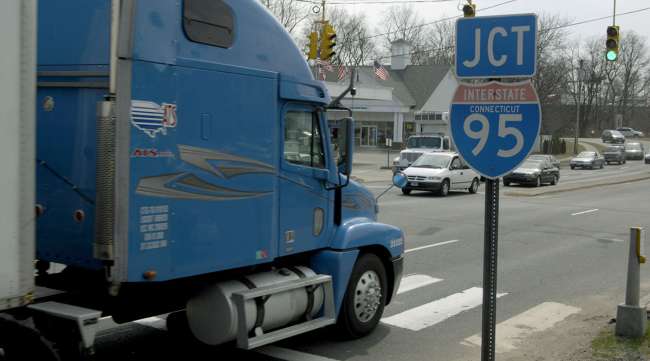Connecticut Post, Bridgeport
Connecticut Truckers Grapple With New Highway Tax

[Stay on top of transportation news: Get TTNews in your inbox.]
With a new highway use tax set to taking effect with the new year, the trucking industry in Connecticut still has many questions about how to comply and who must pay the tax and is also floating the possibility of legal action.
“If we can’t find a legislative or regulatory remedy, then at that point, all bets are off and we need to look at all avenues for redress,” said John Blair, president of the Motor Transport Association of Connecticut. “We are assessing whether or not there’s a legal remedy that we could seek if we’re not going to get a legislative or regulatory remedy.”
Blair said he thinks it’s unlikely the General Assembly will make any changes to the new law such as repeal or delay it, as the industry has pressed for. At a recent event attended by about 100 MTAC members, Blair said many truckers were still seeking guidance about the implementation of the new tax, which is expected to generate about $90 million per year for transportation improvements in Connecticut.
The tax applies to large commercial trucks, which carry a classification between Class 8 and Class 13, with fees ranging from 2.5 cents per mile for vehicles weighing 26,000 to 28,000 pounds to 17.5 cents per mile for trucks weighing more than 80,000 pounds. The first payment is due by Feb. 28.
Blair said he expects the tax will largely be paid by in-state truckers — MTAC has about 450 members — because out-of-state carriers that only come through Connecticut a couple of times per month might take the risk of not paying the tax or might not know about it.
“Like most tax laws in states, they don’t have a lot of enforcement mechanisms. They have back-end compliance,” he said. “But the front end, of course, is not always there.”

Hosts Seth Clevenger and Mike Freeze mark 100 episodes of RoadSigns, which started off four years ago asking, "Autonomous: Who's Behind the Wheel of Tomorrow?" Now, see where trucking was in 2018 and where it's going in 2023. Hear a snippet, above, and get the full program by going to RoadSigns.TTNews.com.
Tiffany Thiele, communications director for the state Department of Revenue Services, said the department is assisting carriers with registrations on a daily basis, and is in regular communications with carriers regarding their responsibility to register with the department.
The agency has notified trucking companies nationally about the new tax, and several thousand drivers have already registered to pay the new fee, according to DRS Commissioner Mark Boughton. Connecticut State Police will be looking for truckers who are not in compliance.
When the General Assembly passed the highway use tax in June 2021, which followed a failed effort by Gov. Ned Lamont to institute highway tolls, Connecticut’s fiscal situation was much different. Now, the state has a “burgeoning” surplus and is getting $5.38 billion from the federal government for infrastructure improvements, Blair said.
But Lamont and other Democrats have said it’s important for Connecticut to show it has dedicated revenue streams such as the highway use tax to help keep the state’s bond rating stable.
In New York, which has had a highway use tax on certain motor vehicles for several years, about 50 percent of out-of-state truckers do not pay the tax, according to numbers Blair said he has seen. “I do believe the burden ultimately falls on our in-state truckers to be paying this tax,” he said.
One of MTAC’s members, Tuxis-Ohrs Fuel, a heating oil supplier based in Meriden, which has 25 big rigs, estimates it will pay $150,000 more per year, Blair said. That increase will be passed down from the carriers to consumers, he said. “They’re not going to eat it as a business owner.”
Want more news? Listen to today's daily briefing below or go here for more info:
Distributed by Tribune Content Agency, LLC




